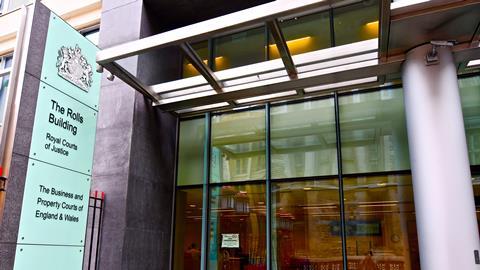The High Court ordered parties to mediate despite defendant arguments that there was no real chance of success, in a newly published ruling thought to be the first time the court has used its new powers under the amended Civil Procedure Rules.
In DKH Retail and others v City Football Group Ltd, a pre-trial review in a trade mark dispute, the judge rejected objections put forward by the defendant to an application for compulsory mediation made by the claimant shortly before trial. A postscript to the 21 November ruling noted that the court was informed this month that the parties had in fact settled.
The dispute, which fell within the Shorter Trials Scheme, was between the owners of the Superdry clothing brand and the company that runs Manchester City Football Club’s commercial operations. It centred around whether promotional branding on players’ kit was likely to be seen by the public as denoting the Superdry brand, or that of the defendant’s sponsor, Asahi Super ‘Dry’ 0.0% lager. The words on the relevant kit included ‘Super’ and ‘Dry’.
Considering the claimant’s application for compulsory mediation, Mr Justice Miles noted that the Civil Procedure Rules were amended with effect from 1 October 2024 to take account of the ruling in Churchill v Merthyr Tydfil County Borough Council that the court has power to order unwilling parties to engage in alternative dispute resolution.
The claimants argued that the court should exercise that power in this case because the dispute was capable of resolution; not particularly complicated; and a mediation might allow for a more flexible compromise beyond the power of the court, for example relating to the size and form of the logo.
The defendant asserted that while there was no dispute about the court’s power to order mediation, it should only do so where there was ‘a realistic prospect of success’, which was not the case here. It argued that it wanted to know ‘once and for all’ whether it could place the Asahi branding on kit and clothing, and that it was entitled to a judicial determination of that question.
The defendant also pointed out that it was very late in the day to seek a mediation order, with the parties having already spent ‘hundreds of thousands of pounds’ and the trial date ‘imminent’.
Rejecting these arguments, the judge said: ‘In many cases the parties’ positions in the litigation are diametrically opposed and it may easily be said that each party requires a judicial determination. But nonetheless the parties come through ADR to recognise the desirability of settling for less than their strict legal rights and compromising their positions.
‘Experience shows that mediation is capable of cracking even the hardest nuts. The process sometimes succeeds in cases where the parties appear at first to have intractable differences…
‘I see some force in the defendant’s submission that it is late in the day to be seeking an order, but it may also be said that there is some advantage in the parties’ positions having been crystallised through pleadings and the service of witness statements. It is indeed sometimes an objection to mediation that it is premature, proposed at a stage when the parties’ positions are unknown. That cannot be said here.
‘There is also some force in [the defendant’s submission] that these are commercial parties with experienced solicitors and that if there was realistically to be a settlement, one would have expected it already to have been reached. But that argument does not do full justice to experience, which shows that bringing the parties together through mediation can overcome an entrenched reluctance of parties to negotiate, even where sincere.
‘The purpose of mediation is to remove roadblocks to settlement. I am unable to accept [the defendant’s submissions] that a mediation here has low prospects of success and that adjudication by a court is necessarily required. The range of options available to the parties to resolve the dispute through mediation goes beyond the binary answer a court could provide. There may be solutions other than yes or no.’
Mr Justice Miles added that a mediation of the case would be ‘short and sharp’, and the documents needed would be brief. He noted that the defendant had not suggested mediation would significantly disrupt the parties’ preparations for trial.
The judge ordered mediation to take place in December: a postscript said the parties had settled their dispute.




























2 Readers' comments